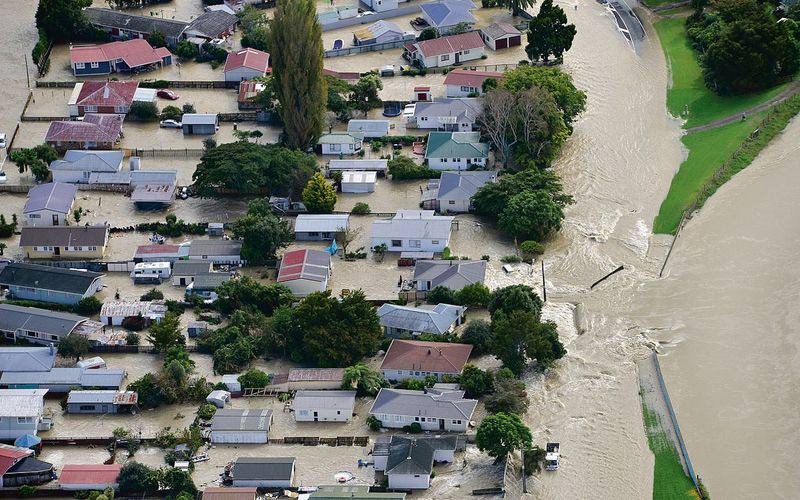There is a lot at stake for those involved in property, as revealed in a study on what New Zealanders believe to be fair in relation to property being built on, bought or sold in areas that are known to be adversely affected by climate change

The research has implications for the reputations of the myriad of organisations involved in climate action, from central and local government to real estate agents, developers, engineers, insurers and banks.
The study of 1000 New Zealanders, commissioned by Anthem and undertaken by Talbot Mills, found that 64% of New Zealanders feel it is unfair to continue to build and develop residential and commercial properties in flood-prone areas as sea levels rise twice as fast as previously forecast.
Respondents were split on the commercial implications for insurers and banks servicing customers with property in flood-prone areas. On balance, a little over half (54%) believe it is fair that insurance premiums for properties in flood-prone areas are rising faster than for other homeowners. Interestingly men (60%) were more likely than women (49%) to consider this fair, and homeowners (63%) were much more likely to consider this fair than renters (43%). Younger people thought insurance premium hikes in flood-prone areas were unfair (59% against).
Similarly, roughly half (52%) of New Zealanders think it is fair for banks to pull back lending for mortgages in high flood-risk locations, with homeowners (63%) more likely to consider this fair than renters (40%).
Less than half (45%) feel it’s fair for councils to continue to provide consents for building on land subject to one or more natural hazards under certain conditions, but the genders were divided on the matter with women (40%) less likely to say it is fair for the councils to grant such consents than men (50%).
And the large majority (82%) expect real estate agents to disclose the flood-risk status of a home while the property is on the market, with older respondents being particularly keen on this (45-59 year olds 85%, 60+ 94%).
The research is part of a regular research series, Fair Enough? examining topical issues and reputation through a fairness lens. The series aims to examine key reputational risks at play and how stakeholders are responding.
With extreme weather events at the forefront of New Zealanders’ minds, Anthem Co-Founder and Managing Director, Carolyn Kerr says fairness has become the currency by which reputations are won or lost.
“With an issue like this involving various industry sectors, government and community stakeholders, how you communicate your position and responsibilities greatly impacts public perception of your organisation.”
Commenting on the research, industry leaders across the banking, insurance, building and engineering sectors agreed that access to good data, cross sectoral collaboration and consumer friendly information were key to organisations helping their customers and stakeholders make good decisions about building, buying or selling properties.
Chief Executive of the Insurance Council of New Zealand, Tim Grafton says every organisation’s reputation is at risk here.
“For the long-term sustainability of a business, you need to embed the risks of climate change into your strategy and business plan”.
Beca’s Group Director – Advisory and Chief Planner Amelia Linzey says our understanding of the impacts of climate change and the scale of adaptation required for all infrastructure is growing.
“We as professionals in delivery of infrastructure, now need to stand up and work with communities to help find solutions to enable us to adapt and be resilient, driving future focused solutions with integrity.”
Chief Executive of Tower Insurance, Blair Turnbull says for the first time, we are all realising that this is our generational challenge and everyone coming together collaboratively is one of the ways we can help solve it.
“Being transparent with customers will be crucial to building and maintaining trust as we navigate the uncertainty or climate change together.”
With public expectation putting reputations at risk, communication and community engagement becomes a powerful tool for garnering public support and building understanding.
Chief Executive of the New Zealand Bankers’ Association, Roger Beaumont says we need to be open and clear with people about what the story is in their area.
“It’s crucial to discuss their individual risk in consideration of the challenges we are facing as a country.”
Front footing actions organisations are taking to adapt to climate risk is vital according to Steve Evans, Chief Executive of Fletcher Building’s Residential and Development Division.
“Beyond the social license and reputation risk of not taking action, the risk of inaction also needs to be considered,” he says.
“If people don’t understand why you’re doing certain things, they’re not going to support you, and while public need to make sure they are keeping themselves informed, it’s also on industry leaders to share data in a way every Kiwi can understand.”
Talbot Mills Research Managing Director, David Talbot, concludes that it is clear New Zealanders are concerned about the adverse effects of climate change.
“To ensure trust in companies addressing the issue, the complexities of the issue mean collaboration and communication are key for organisations to maintain and enhance their reputations as they develop climate adaptation plans.”
For more information and the full survey results, visit www.blog.anthem.co.nz.












